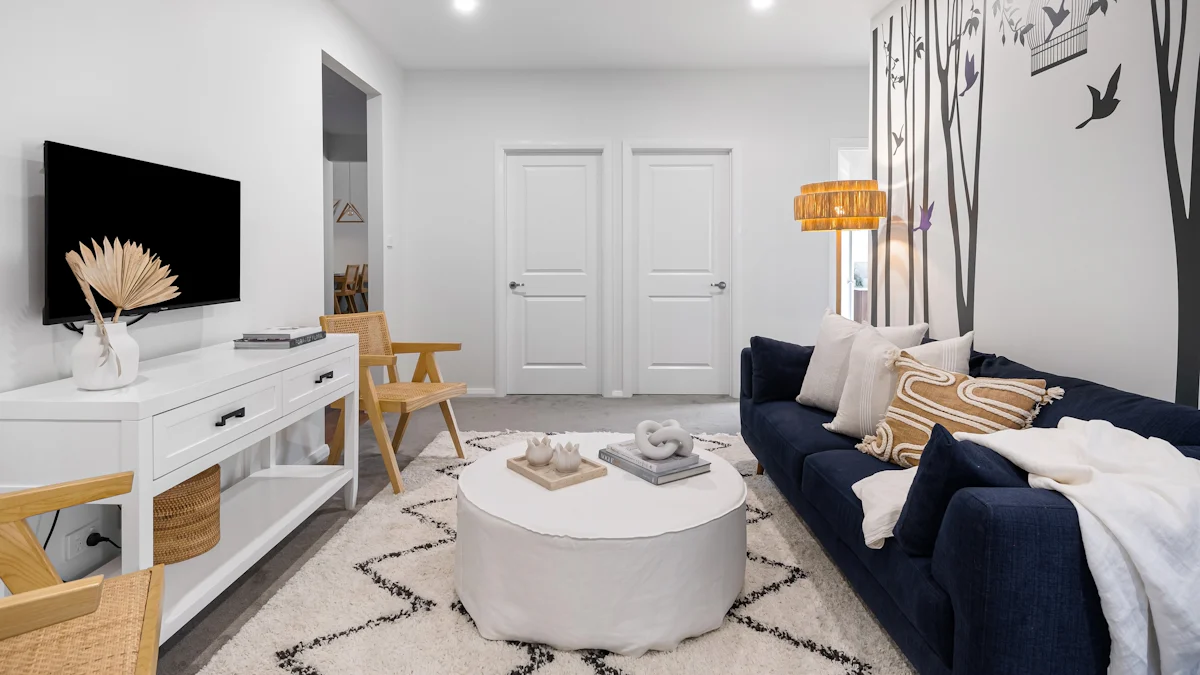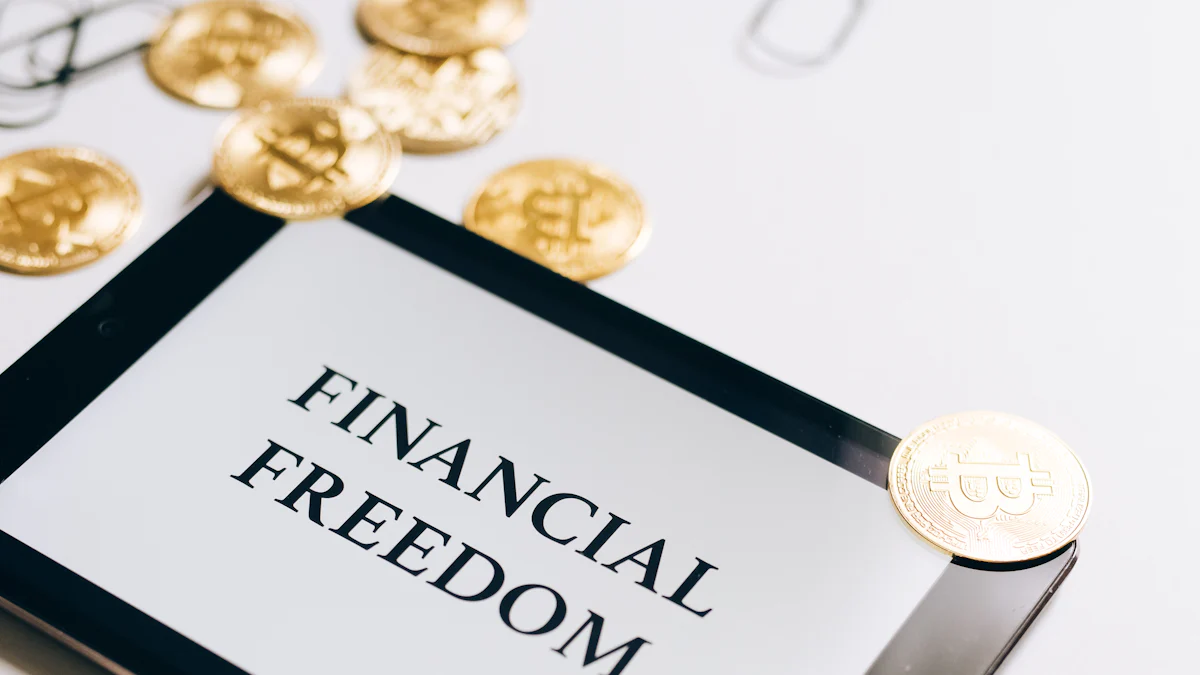The Financial Benefits of Minimalism: Spend Less, Live More

Minimalism is more than just decluttering your home. It’s a lifestyle that embraces simplicity and intentionality, helping you focus on what truly matters. By living with less, you can spend less and unlock financial freedom. Imagine fewer bills, reduced stress, and more savings for the future. Owning fewer possessions also means lower maintenance costs and fewer distractions, giving you the freedom to live more with less. Studies even show that minimalism enhances happiness by shifting your focus from material things to meaningful experiences. With this approach, you can create a life filled with clarity, purpose, and financial benefits.
Key Takeaways
Try minimalism to save money and gain financial freedom. Focus on what you need, not just what you want.
Think carefully before buying anything. This stops impulse shopping and matches spending with your values.
Clean out your home and sell unused items. This gives you extra money and supports a simple lifestyle.
Buy fewer but better-quality things. Strong, lasting items save money over time and make life better.
Spend less on stuff and more on experiences. Experiences bring more joy and create lasting memories.
Understanding the Financial Benefits of Minimalism
What Is a Minimalist Lifestyle?
A minimalist lifestyle revolves around simplicity and intentional living. It’s about focusing on what truly matters and letting go of unnecessary possessions or habits. This approach encourages you to prioritize experiences and relationships over material goods. By living with less, you gain clarity and reduce distractions, creating space for what brings genuine happiness. Financial minimalism, a key aspect of this lifestyle, emphasizes mindful spending and aligning your financial choices with your values. This shift not only simplifies your life but also enhances your financial well-being.
Minimalism promotes living within your means and avoiding debt. It encourages you to focus on needs rather than wants, which helps you manage your finances more effectively. By reducing consumption, you save money and redirect it toward meaningful goals like travel, education, or building a secure future. This minimalist mindset fosters financial freedom and a more fulfilling life.
The Connection Between Minimalism and Financial Well-Being
Minimalism and financial well-being go hand in hand. When you embrace financial minimalism, you make intentional choices that align with your priorities. This approach reduces financial stress and helps you build a solid foundation for long-term security. By avoiding unnecessary purchases, you save money and avoid the trap of financing items with credit. This disciplined approach allows you to allocate more income toward debt repayment or savings.
Living with less also means fewer maintenance costs and less time spent managing possessions. For example, owning fewer items reduces the need for repairs or replacements. This simplicity makes it easier to focus on your financial goals and stick to a budget. Minimalism helps you break free from the consumer-driven mindset, allowing you to find satisfaction in experiences rather than material possessions.
How Financial Minimalism Reduces Waste and Saves Money
Financial minimalism is a powerful tool for reducing waste and saving money. By adopting this lifestyle, you can make small changes that lead to significant financial benefits. For instance, cooking meals at home instead of dining out frequently saves money and reduces food waste. Choosing high-quality, timeless clothing over seasonal fast fashion minimizes expenses and environmental impact. Downsizing your living space can lower housing costs while simplifying your life.
You can also generate extra income by selling unwanted items or donating them to reduce clutter. Extending the use of technology instead of upgrading frequently is another way to save. Limiting entertainment subscriptions or choosing not to own a car when feasible are practical steps that align with financial minimalism. These habits not only help you save money but also contribute to a more sustainable lifestyle.
Practical Strategies for Spending Less
Mindful Purchasing for Intentional Spending
Mindful purchasing helps you make better financial decisions by focusing on what truly matters. It encourages you to pause and evaluate your needs before spending. For example, withdrawing only the cash you need from an ATM can prevent overspending. Adjusting your budget to reflect your current lifestyle ensures that your spending aligns with your priorities. Planning for large expenses in advance helps you avoid financial stress.
You can also set aside guilt-free spending money after covering your essential expenses. This allows you to enjoy small indulgences without derailing your financial goals. Before making significant purchases, take a moment to assess their necessity. Ask yourself if the item adds value to your life or aligns with your goals. Finding an accountability partner can also keep you on track with responsible spending. By practicing intentional spending, you can achieve simplicity and greater financial control.
Decluttering to Generate Extra Income
Decluttering your home not only creates a more organized space but also provides an opportunity to earn extra income. Many items you no longer use could be valuable to others. High-quality furniture, luxury goods like jewelry or watches, and vintage pieces are great examples. Platforms like Poshmark or consignment stores make it easy to sell secondhand clothing or unique items.
Even unused household items can find new homes through services like Freecycle or OfferUp. Selling these items not only boosts your savings but also reinforces the minimalist mindset. You’ll feel lighter and more focused while enjoying the financial benefits of letting go of excess.
Prioritizing Quality Over Quantity for Long-Term Savings
Choosing quality over quantity is a smart way to save money in the long run. Durable electronics, such as a high-grade laptop, offer better performance and longevity. High-quality furniture combines style and durability, lasting much longer than cheaper alternatives. Investing in energy-efficient appliances reduces utility bills over time, adding to your savings.
For instance, by purchasing a high-quality product, you could save hundreds of dollars over several years compared to replacing a cheaper option frequently. This approach reflects responsible spending and ensures you get the most value for your money. Prioritizing quality also aligns with the minimalist principle of owning fewer but better items, enhancing both your financial and personal well-being.
Using Minimalism to Achieve Debt Freedom
Building Disciplined Financial Habits
Achieving debt freedom starts with building disciplined financial habits. A minimalist lifestyle encourages you to focus on what truly matters, helping you align your spending with your values. Begin by defining what financial freedom means to you. Whether it’s being debt-free or having substantial savings, having a clear goal will guide your decisions. Set specific, achievable financial goals to stay motivated and track your progress.
Living below your means is a cornerstone of financial minimalism. By prioritizing needs over wants, you can avoid unnecessary purchases and credit card debt. Conscious spending ensures that every dollar serves a purpose, whether it’s paying off debt or contributing to savings. Decluttering and downsizing your lifestyle can also free up resources, making it easier to achieve financial security. These habits not only simplify your finances but also pave the way for long-term freedom.
Strategies for Paying Off Debt Faster
Paying off debt faster requires a focused and intentional approach. Start by creating a detailed budget. Outline your income, expenses, and debt obligations to identify areas where you can cut back. Prioritize debt repayment by tackling either high-interest debts first or smaller debts to build momentum. Reducing expenses, such as dining out or unnecessary subscriptions, can free up extra money for payments.
Consider increasing your income through side gigs or selling unused items. Negotiating with creditors for lower interest rates or revised payment plans can also make a significant difference. If you have multiple debts, consolidating them into a single loan with better terms can simplify repayment. Celebrate small milestones along the way to stay motivated. These strategies, combined with a minimalist mindset, can help you achieve debt freedom more efficiently.
Avoiding Future Debt Through Intentional Living
Avoiding future debt requires a commitment to intentional living. Minimalism teaches you to distinguish between needs and wants, ensuring that your spending aligns with your priorities. By reducing unnecessary expenses, you can save more and avoid relying on credit. Living below your means becomes second nature when you embrace financial minimalism.
Plan your financial goals carefully and stick to them. Focus on meaningful purchases that add value to your life rather than impulsive buys. This approach not only prevents new debt but also strengthens your financial security. With a minimalist mindset, you’ll find it easier to maintain control over your finances and enjoy the freedom that comes with intentional living.
Investing in Experiences Over Material Possessions

Why Experiences Are More Fulfilling Than Things
You’ve probably noticed how the excitement of buying something new fades quickly. Experiences, on the other hand, leave a lasting impact. Research shows that people feel greater happiness from experiential purchases compared to material ones. Why? Experiences create memories that stay with you for years. Whether it’s a family road trip or a cooking class with friends, these moments bring more joy from experiences than any object ever could.
Experiences also strengthen your relationships. Shared activities, like hiking or attending a concert, foster deeper connections with loved ones. Reflecting on these moments enhances your sense of closeness and satisfaction. Plus, talking about experiences is far more engaging than discussing possessions. Imagine the difference between sharing a story about a weekend getaway versus describing a new gadget. Experiences bring people together in ways that material things cannot.
The Financial Benefits of Investing in Experiences
Investing in experiences doesn’t just make you happier—it’s also a smart financial choice. Unlike material goods, which lose value over time, experiences provide lasting satisfaction. For example, a weekend camping trip costs less than a luxury handbag but offers memories you’ll cherish forever. By focusing on experiences, you can enjoy life while saving money.
Experiences often come with fewer hidden costs. A material purchase might require maintenance or upgrades, but a picnic in the park or a local art class doesn’t. These choices allow you to allocate your savings toward meaningful goals. Studies even show that people report better moods when reminiscing about experiences rather than material goods. This shift in spending can lead to both financial stability and greater happiness.
Emotional and Long-Term Rewards of Minimalist Living
Minimalism encourages you to focus on experience rather than accumulating things. This shift reduces clutter and creates a more peaceful environment. A study found that people living in organized spaces felt less stressed and more positive throughout the day. By embracing minimalism, you can prioritize meaningful experiences that bring joy and fulfillment.
Living with less also improves your emotional well-being. A clutter-free home eliminates distractions, allowing you to focus on what truly matters. Psychologists explain that this clarity fosters better decision-making and reduces anxiety. Minimalism also promotes mindful spending, which leads to financial security. When you feel confident about your finances, you can enjoy life’s experiences without worry. Over time, this lifestyle brings emotional rewards that far outweigh the fleeting satisfaction of material possessions.
Minimalism and Sustainable Financial Choices

Aligning Minimalism With Eco-Friendly Practices
Minimalism and eco-friendly practices share a common goal: reducing excess and focusing on what truly matters. By adopting a minimalist lifestyle, you naturally consume less, which benefits both your wallet and the planet. For instance, avoiding frequent upgrades to the latest gadgets or seasonal fashion trends helps you save money while reducing waste. Instead, you can invest in durable, multifunctional items that last longer and align with your values.
Cooking meals at home rather than dining out regularly is another way to embrace simplicity while saving money. This approach not only reduces food waste but also minimizes the environmental impact of packaging and transportation. By owning fewer possessions, you also decrease the resources needed for production, contributing to a more sustainable world. Minimalism encourages intentional living, where every choice reflects your commitment to both financial and environmental well-being.
Saving Money Through Sustainable Living
Sustainable living and financial minimalism go hand in hand. By consuming less, you reduce your environmental footprint and save money. For example, downsizing your living space can lower utility bills by reducing energy consumption. Repairing or repurposing items instead of buying new ones significantly cuts expenses while promoting sustainability. Owning fewer possessions also means lower maintenance costs, saving you money on repairs and upkeep.
Mindful consumption plays a key role in sustainable living. When you commit to buying only what you truly need, you naturally spend less. This doesn’t mean sacrificing quality. Investing in high-quality, sustainable products saves money in the long run by reducing the need for replacements. These practices not only align with financial minimalism but also help you achieve financial stability and freedom.
The Overlap Between Minimalism and Environmental Responsibility
Minimalism and environmental responsibility complement each other beautifully. Living minimally decreases your carbon footprint by reducing the demand for manufacturing and transportation. Choosing eco-friendly products supports sustainability while encouraging thoughtful purchasing. For example, opting for reusable items like water bottles or cloth bags reduces waste and saves money over time.
The financial benefits of this overlap are significant. By living within your means, you avoid debt and promote financial stability. Downsizing your lifestyle, whether through smaller living spaces or fewer possessions, lowers expenses and simplifies your life. Minimalism fosters intentional living, where every decision aligns with your values and contributes to a healthier planet. This harmony between financial and environmental goals creates a fulfilling and sustainable way of life.
Simplifying Financial Planning With Minimalism
Budgeting for a Minimalist Lifestyle
Creating a minimalist budget helps you simplify your financial world and focus on what truly matters. Start by identifying your essential expenses, such as housing, food, and transportation. Eliminate unnecessary costs like unused subscriptions or impulse purchases. This approach ensures your spending aligns with your values and goals. A minimalist budget isn’t about deprivation—it’s about intentionality. You decide where your money goes, giving you more control over your finances.
Living with less allows you to allocate more income toward savings or paying off debt. For example, avoiding frequent upgrades to gadgets or trendy items can save you hundreds of dollars annually. By prioritizing quality over quantity, you reduce the need for replacements, which boosts your savings over time. A minimalist budget not only simplifies your financial life but also sets the stage for long-term financial freedom.
Reducing Financial Complexity for Peace of Mind
Financial minimalism reduces the stress of managing money by simplifying your financial world. Consolidate your accounts to make tracking expenses easier. Automate bill payments and savings contributions to avoid missed deadlines. These small steps free up mental energy and help you stay organized.
Owning fewer possessions also reduces financial complexity. With fewer items to maintain or replace, you’ll spend less time and money managing your belongings. This simplicity fosters peace of mind and allows you to focus on meaningful goals. By adopting a minimalist mindset, you create a financial system that works for you, not against you.
Achieving Long-Term Financial Freedom Through Minimalism
Minimalism paves the way for long-term financial freedom by breaking the cycle of consumerism. When you embrace financial minimalism, you shift your focus from accumulating things to building a secure future. Living within your means helps you avoid debt and allocate more income toward savings or investments. This approach fosters financial security and independence.
Minimalism encourages healthier financial habits. By reducing unnecessary expenses, you can build an emergency fund or save for retirement. Intentional financial decisions, such as investing in experiences over material possessions, enrich your life while strengthening your financial foundation. Over time, these habits lead to long-term financial freedom, allowing you to live a life of purpose and fulfillment.
Living with less offers you more than just financial benefits—it transforms your life. By reducing unnecessary expenses, you can boost your savings and allocate more income toward meaningful goals. Avoiding impulse purchases and focusing on needs rather than wants helps you live within your means, paving the way for debt reduction and long-term financial benefits. Minimalism simplifies your financial obligations, giving you clarity and peace of mind.
Beyond the numbers, this lifestyle enriches your emotional well-being. Investing in experiences over material possessions creates lasting memories and strengthens relationships. You’ll find joy in moments, not things, and discover a deeper sense of fulfillment. Embracing minimalism allows you to focus on what truly matters, leading to financial freedom and a more meaningful life. Start your journey today—your future self will thank you.
See Also
Essential Budgeting Tips For Newbies Seeking Wealth
Achieve Debt Freedom By 2025 With These Tips
Daily Practices That Lead To Financial Success

